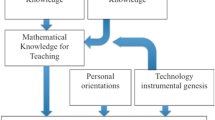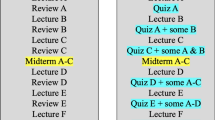Abstract
Instruments designed to measure teachers’ knowledge for teaching mathematics have been widely used to evaluate the impact of professional development and to investigate the role of teachers’ knowledge in teaching and student learning. These instruments assess a mixture of content knowledge and pedagogical content knowledge. However, little attention has been given to the content alignment between such instruments and curricular standards, particularly in regard to how content knowledge and pedagogical content knowledge items are distributed across mathematical topics. This article provides content maps for two widely used teacher assessment instruments in the USA relative to the widely adopted Common Core State Standards. This common reference enables comparisons of content alignment both between the instruments and between parallel forms within each instrument. The findings indicate that only a small number of items on both instruments are designed to capture teachers’ pedagogical content knowledge and that the majority of these items are focused on curricular topics in the later grades rather than in the early grades. Furthermore, some forms designed for use as pre- and post-assessment of professional development or teacher education are not parallel in terms of curricular topics, so estimates of teachers’ knowledge growth based on these forms may not mean what users assume. The implications of these findings for teacher educators and researchers who use teacher knowledge instruments are discussed.
















Similar content being viewed by others
Notes
Some may disagree that including prior relevant standards for CK items could overly credit standard representation if the items are designed to capture certain knowledge types, such as memorization knowledge (i.e., DTAMS Type I). Although this may be true in some cases, others are difficult to justify, e.g., how could a teacher demonstrate memorized knowledge of two-digit numbers yet not be able to demonstrate memorized knowledge of single-digit numbers?
We followed the same process for coding teacher knowledge items used in our prior work (for a detailed description, see Copur-Gencturk et al. 2019).
Although we used the actual assessment items in our coding, we were not permitted to share these items. To overcome this problem, we included sample items to give readers a sense of how the coding worked. Please note that these sample items are similar to the actual items in terms of the kinds of knowledge measured and how the knowledge domain was captured. Because the LMT instrument developers shared a set of items that were no longer part of the currently used assessments (Ball and Hill 2008), we included two items from this document. Because the DTAMS did not have a similar publicly available document, we created a CK item for the purpose of illustration that was similar to the ones we coded in the actual assessment.
Although one of the options included the skipped counting by 8 s, which is not covered by the CCSSM, we still considered this item as falling into a third-grade standard because hypothetically, a third-grade student could come up with a skipped counting strategy.
Recall that an empty cell indicates no items were identified as measuring that particular content.
We identified four and two PCK items on the LMT rational number forms, respectively.
We identified five and three PCK items on the DTAMS rational number forms, respectively.
We identified 11 CK items on each of the LMT numbers and operations forms and 13 and 14 CK items on the LMT rational number forms. We also identified 17 CK items on each of the DTAMS whole numbers and operations forms and 17 and 18 CK items on the DTAMS rational number forms.
References
Abt Associates, Inc. (2010). Mathematics and science partnerships: Summary of performance period 2008 annual reports. Retrieved from http://www.ed-msp.net/public_documents/document/annual/MSP%20PP08%20Annual%20Final%20Report.doc.
Abt Associates, Inc. (2013). Mathematics and science partnerships: Summary of performance period 2011 annual reports. Retrieved from http://www.ed-msp.net/images/public_documents/document/annual/MSP%20PP11%20Annual%20Final%20Report.pdf.
American Educational Research Association, American Psychological Association, & National Council on Measurement in Education. (2014). Standards for educational and psychological testing. Washington, DC: American Educational Research Association.
Ball, D.L., & Hill, H.C. (2008). Mathematical knowledge for teaching (MKT) measures. Mathematics released items 2008. Retrieved September 12, 2010, from http://sitemaker.umich.edu/lmt/files/LMT_sample_items.pdf.
Baumert, J., Kunter, M., Blum, W., Brunner, M., Voss, T., Jordan, A., et al. (2010). Teachers’ mathematical knowledge, cognitive activation in the classroom, and student progress. American Educational Research Journal, 47, 133–180.
Blazar, D. (2015). Effective teaching in elementary mathematics: Identifying classroom practices that support student achievement. Economics of Education Review, 48, 16–29.
Campbell, P. F., Nishio, M., Smith, T. M., Clark, L. M., Conant, D. L., Rust, A. H., et al. (2014). The relationship between teachers’ mathematical content and pedagogical knowledge, teachers’ perceptions, and student achievement. Journal for Research in Mathematics Education, 45(4), 419–459.
Carpenter, T. P., Fennema, E., Peterson, P. L., & Carey, D. A. (1988). Teachers’ pedagogical content knowledge of students’ problem solving in elementary arithmetic. Journal for Research in Mathematics Education, 19, 29–37.
Chick, H. L. (2007). Teaching and learning by example. In J. Watson & K. Beswick (Eds.), Mathematics: Essential research, essential practice (proceedings of the 30th annual conference of the Mathematics Education Research Group of Australasia (pp. 3–21). Sydney: MERGA.
Chick, H. L., Baker, M., Pham, T., & Cheng, H. (2006). Aspects of teachers’ pedagogical content knowledge for decimals. In J. Novotná, H. Moraová, M. Krátká, & N. Stehlíková (Eds.), Proceedings of the 30th annual conference of the international group for the psychology of mathematics education (Vol. 2, pp. 297–304). Prague: PME.
Common Core Standards Writing Team. (2019). Progressions for the Common Core State Standards for Mathematics (draft February7, 2019). Tucson, AZ: Institute for Mathematics and Education. Retrieved from http://mathematicalmusings.org/wp-content/uploads/2019/02/Progressions_CC_to_RP_02072019.pdf.
Copur-Gencturk, Y. (2015). The effects of changes in mathematical knowledge on teaching: A longitudinal study of teachers’ knowledge and instruction. Journal for Research in Mathematics Education, 46(3), 280–330.
Copur-Gencturk, Y., & Lubienski, S. T. (2013). Measuring mathematical knowledge for teaching: a longitudinal study using two measures. Journal of Mathematics Teacher Education, 16(3), 211–236.
Copur-Gencturk, Y., Tolar, T., Jacobson, E., & Fan, W. (2019). An Empirical Study of the Dimensionality of the Mathematical Knowledge for Teaching Construct. Journal of Teacher Education, 70(5), 485–497.
Diagnostic Teacher Assessment in Mathematics and Science [DTAMS] (n.d). Elementary Mathematics Teacher Assessments. Retrieved March 18, 2020 from https://louisville.edu/education/centers/crimsted/dtams/diag-math-assess-elem.
Even, R. (1993). Subject-matter knowledge and pedagogical content knowledge: Prospective secondary teachers and the function concept. Journal for Research in Mathematics Education, 24, 94–116.
Gersten, R., Taylor, M. J., Keys, T. D., Rolfhus, E., & Newman-Gonchar, R. (2014). Summary of research on the effectiveness of math professional development approaches. REL 2014–010. Regional Educational Laboratory Southeast.
Goldsmith, L. T., Doerr, H. M., & Lewis, C. C. (2014). Mathematics teachers’ learning: A conceptual framework and synthesis of research. Journal of Mathematics Teacher Education, 17(1), 5–36.
Hill, H. C. (2007). Introduction to MKT Scales. Mathematical Knowledge for Teaching (MKT) measures. Ann Arbor, MI: University of Michigan.
Hill, H. C. (2010). The nature and predictors of elementary teachers' mathematical knowledge for teaching. Journal for Research in Mathematics Education, 513–545.
Hill, H. C., Blunk, M. L., Charalambous, C. Y., Lewis, J. M., Phelps, G. C., Sleep, L., et al. (2008). Mathematical knowledge for teaching and the mathematical quality of instruction: An exploratory study. Cognition and instruction, 26(4), 430–511.
Hill, H. C., Rowan, B., & Ball, D. L. (2005). Effects of teachers’ mathematical knowledge for teaching on student achievement. American Educational Research Journal, 42(2), 371–406.
Hill, H. C., Schilling, S. G., & Ball, D. L. (2004). Developing measures of teachers’ mathematics knowledge for teaching. The Elementary School Journal, 105, 11–30.
Izsák, A., Jacobson, E., de Araujo, Z., & Orrill, C. H. (2012). Measuring mathematical knowledge for teaching fractions with drawn quantities. Journal for Research in Mathematics Education, 43(4), 391–427.
Kane, M. T. (2004). Certification testing as an illustration of argument-based validation. Measurement, 2(3), 135–170.
Kane, M. T. (2013). Validating the interpretations and uses of test scores. Journal of Educational Measurement, 50(1), 1–73.
Kersting, N. B., Givvin, K. B., Thompson, B. J., Santagata, R., & Stigler, J. W. (2012). Measuring usable knowledge: Teachers’ analyses of mathematics classroom videos predict teaching quality and student learning. American Educational Research Journal, 49(3), 568–589.
Learning Mathematics for Teaching [LMT] (n.d.). Learning Mathematics for Teaching (LMT) Project. Retrieved March 18, 2020 from http://www.umich.edu/~lmtweb/.
Mack, N. K. (1995). Confounding whole-number and fraction concepts when building on informal knowledge. Journal for Research in Mathematics Education, 26, 422–441.
Minner, D., Martinez, A., & Freeman, B. (2013). Compendium of research instruments for STEM education. Part 1: Teacher practices, PCK, and content knowledge (with addendum). Cambridge: Abt Associates. Retrieved from Education Development Center, CADRE website: http://cadrek12.org/sites/default/files/Compendium%20of%20STEM%20instruments%20Part%201.pdf.
Mullis, I. V. S., & Martin, M. O. (Eds.). (2017). TIMSS 2019 Assessment Frameworks. Retrieved from Boston College, TIMSS & PIRLS International Study Center website: http://timssandpirls.bc.edu/timss2019/frameworks/.
Ottmar, E. R., Rimm-Kaufman, S. E., Larsen, R. A., & Berry, R. Q. (2015). Mathematical knowledge for teaching, standards-based mathematics teaching practices, and student achievement in the context of the responsive classroom approach. American Educational Research Journal, 52(4), 787–821.
Remillard, J., & Kim, O. K. (2017). Knowledge of curriculum embedded mathematics: exploring a critical domain of teaching. Educational Studies in Mathematics, 96, 1–17.
Rowland, T., Huckstep, P., & Thwaites, A. (2005). Elementary teachers’ mathematics subject knowledge: The knowledge quartet and the case of Naomi. Journal of Mathematics Teacher Education, 8(3), 255–281.
Saderholm, J., Ronau, R., Brown, E. T., & Collins, G. (2010). Validation of the diagnostic teacher assessment of mathematics and science (DTAMS) instrument. School Science and Mathematics, 110(4), 180–192.
Schilling, S. G. (2007). The role of psychometric modeling in test validation: An application of multidimensional item response theory. Measurement, 5(2–3), 93–106.
Shulman, L. S. (1986). Those who understand: Knowledge growth in teaching. Educational Researcher, 15(2), 4–14.
Shulman, L. (1987). Knowledge and teaching: Foundations of the new reform. Harvard Educational Review, 57(1), 1–23.
Supovitz, J., Ebby, C. B., & Sirinides, P. (2013). Teacher analysis of student knowledge (TASK): A measure of learning trajectory-oriented formative assessment. Consortium for Policy Research in Education.
Tatto, M. T., Schwille, J., Senk, S., Ingvarson, L., Peck, R., & Rowley, G. (2008). teacher education and development study in mathematics (TEDS-M): Conceptual framework. East Lansing: Teacher Education and Development International Study Center, College of Education, Michigan State University.
Tchoshanov, M. A. (2011). Relationship between teacher knowledge of concepts and connections, teaching practice, and student achievement in middle grades mathematics. Educational Studies in Mathematics, 76(2), 141–164.
Funding
The research reported in this article was supported in part by the National Science Foundation Interagency Educational Research Initiative (Grants #1561453 and 1813760) and Herman & Rasiej Math Initiative. The opinions expressed are those of the authors and do not reflect the views of the National Science Foundation or Hermann & Rasiej Math Initiative.
Author information
Authors and Affiliations
Corresponding author
Additional information
Publisher's Note
Springer Nature remains neutral with regard to jurisdictional claims in published maps and institutional affiliations.
Rights and permissions
About this article
Cite this article
Copur-Gencturk, Y., Jacobson, E. & Rasiej, R. On the alignment of teachers’ mathematical content knowledge assessments with the common core state standards. J Math Teacher Educ 25, 267–291 (2022). https://doi.org/10.1007/s10857-021-09486-4
Accepted:
Published:
Issue Date:
DOI: https://doi.org/10.1007/s10857-021-09486-4




